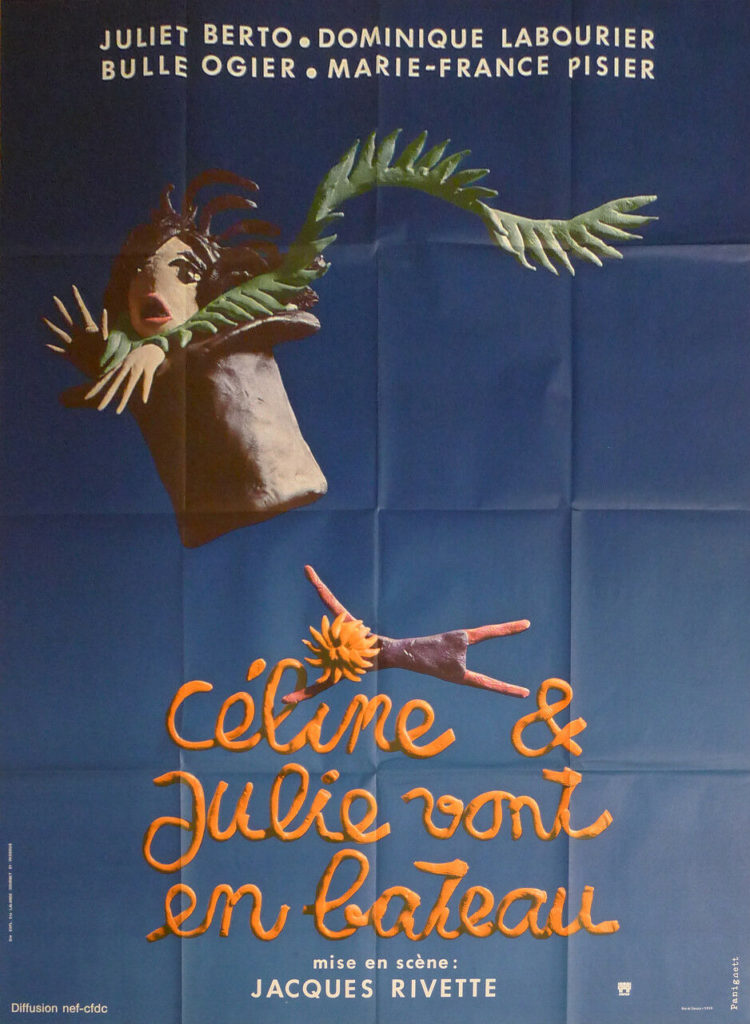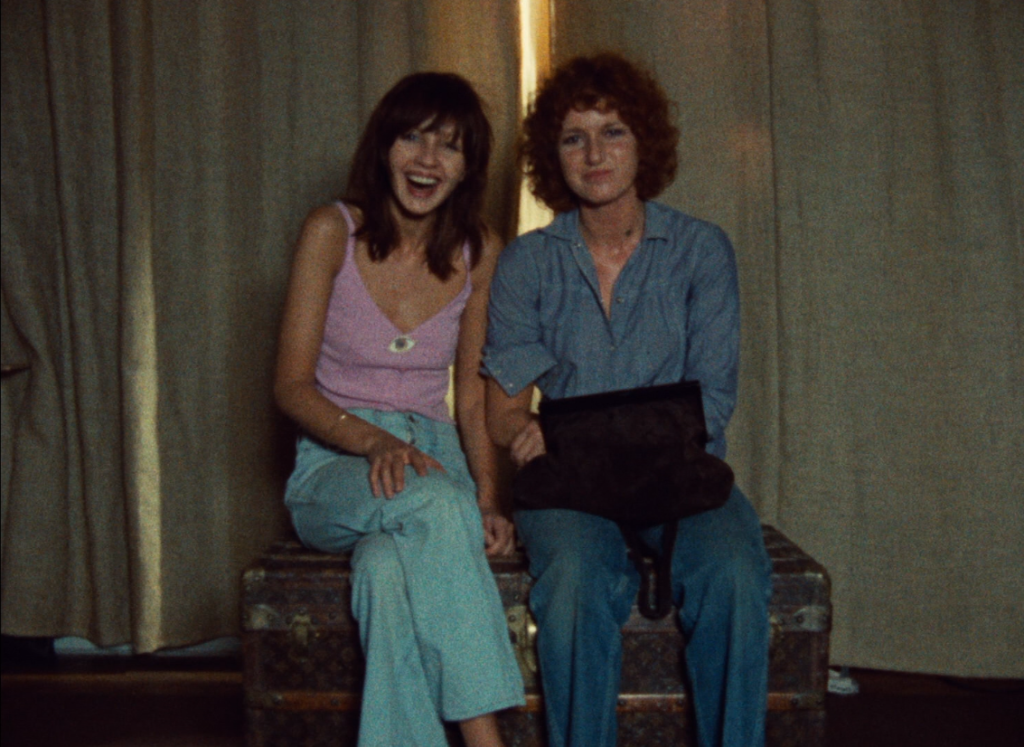
“Phantom Ladies Over Paris” is the subtitle of Céline and Julie Go Boating (1974), and it’s a good indication of what you’re going to get with Jacques Rivette’s fifth film: part epic serialized fantastique adventure in the tradition of Feuillade’s Les Vampires (1915), part outrageous Parisian love letter, its two main characters floating above the city with their intermingled identities and occasional psychic bursts of omniscience. The film has endured as a beloved art house classic and remains the most popular of Rivette’s output, even though it’s shot in 16mm in Academy ratio, features no soundtrack apart from what instruments are played on-screen, and breaks the three-hour mark while indulging in every possibly whimsical digression. Like so many of Rivette’s films, it’s untidy, sprawling, and improvisatory, a portrait of Paris as an endlessly surprising labyrinth in which the fantastical and the mundane co-exist, revealing secrets to those willing to pursue hidden riddles. It’s also bursting with feminine spirit – or, should we say, spirits, given the number of phantoms on display – Rivette ceding much of the story’s shape and ideas to the two stars, Juliet Berto (Out 1) and Dominique Labourier (Jonah Who Will Be 25 in the Year 2000). Finally, after a too-long hiatus from home video in the U.S., the film is available to sink its hooks into new fans thanks to a new 2-disc Blu-ray special edition from Criterion.
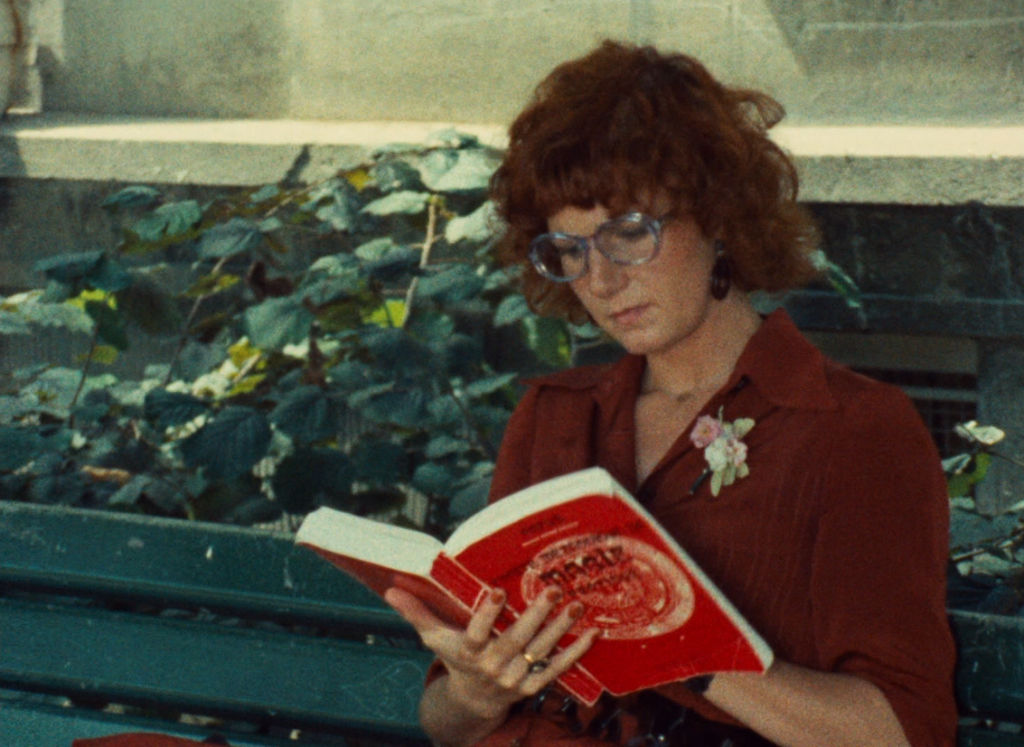
Librarian Julie (Dominique Labourier), studying magic.
Magic is present from the very opening, as librarian Julie (Labourier), with her curly mop of red hair, carefully traces an occult symbol in the dirt while sitting on a park bench. When a stranger, the dark-haired magician Céline (Berto), darts by, sunglasses and scarves dropping in her winding wake, Julie picks them up and gives chase, pursuing her White Rabbit through Montmartre. Somewhere along the way, Julie loses all interest in giving back her props, hiding whenever Céline casts a glance behind her. Then Céline tries to keeps tabs on Julie, and it’s not clear who is chasing whom. When the two finally do meet – in a café, the items returned with mutual disinterest – they act as if they’ve known each other a long time. And perhaps they have. As the film tells us at the start, “Usually, it began like this…” – initiating an intoxicating Möbius strip. Another caption recurs throughout, like chapter titles that never progress: “But, the next morning…” A reference, perhaps, to the daybreak refrain from Arabian Nights, interrupting each story with Scheherazade’s promise to continue her tale the next day while her sister Dinarzade pays her compliments to the storytelling. In Céline and Julie Go Boating, the title characters form another dynamic female duo, in line with Scheherazade/Dinarzade and forming a prototype for Rivette films to come such as Duelle (1976) and Le Pont du Nord (1981). (Female doubles also recur in the films of Jean Rollin, who worked in the exploitation arena but whose works frequently play like grindhouse echoes of Rivette.) Céline is not Julie, and Julie is not Céline – they are distinctively different, at least, until they are not. When they share a Bloody Mary, sipping from the same glass, we feel we’re witnessing an ancient arcane bonding ritual. They proceed to share secrets without speaking them, and they swap places and roles: Céline pretends to be Julie for a rendezvous with Julie’s childhood sweetheart; Julie masquerades as Céline’s magician “Mandrakore” (as in, Mandrake the Magician) for an important audition. Both are acts of wistful sabotage. Neither holds a grudge. The important thing is the haunted house.
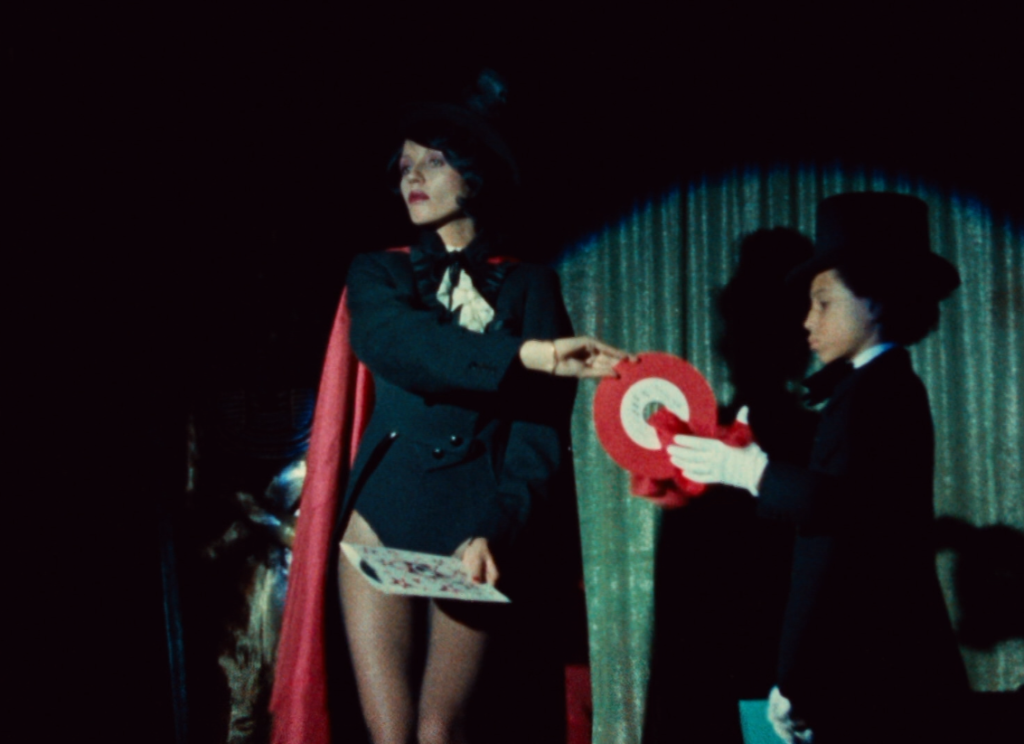
Juliet Berto as Céline as Mandrakore the Magician.
The central mystery which preoccupies these two is a mysterious abandoned house that, upon being permitted entrance at a specific time of day, reveals a tragic past which is immediately forgotten, like a dream, when they’re expelled down its front steps some time later, a piece of hard candy in their mouths as they stumble groggily into a taxi. The only way to recall what they witnessed is to suck on the candy, revealing fragmented moments of a family melodrama (which includes director Barbet Schroeder) that seem to have culminated in the murder of a little girl. The two magical sleuths move in together. Julie draws a diagram of the house on a chalkboard and uses her collection of dolls to decipher the cast of characters. They discover a photo of the house within Julie’s chest; we later learn that she lived just across from it as a child and knew the girl who died. But the mystery – a story within a story, as in Arabian Nights – is also an entertainment. Late in the film, the pair suck on their candies together and watch the story unfold as spectators, jeering at the clichés, mocking the villains, squealing with delight at the plot twists. And so this becomes a centerpiece in Rivette’s filmography exploring the fuzzy boundary between theatrical performance and the audience, which was explored in his marathon experiment Out 1 (1971) and would recur in most of his later films, including the underrated, masterful Love on the Ground (1983), a Céline and Julie companion piece.
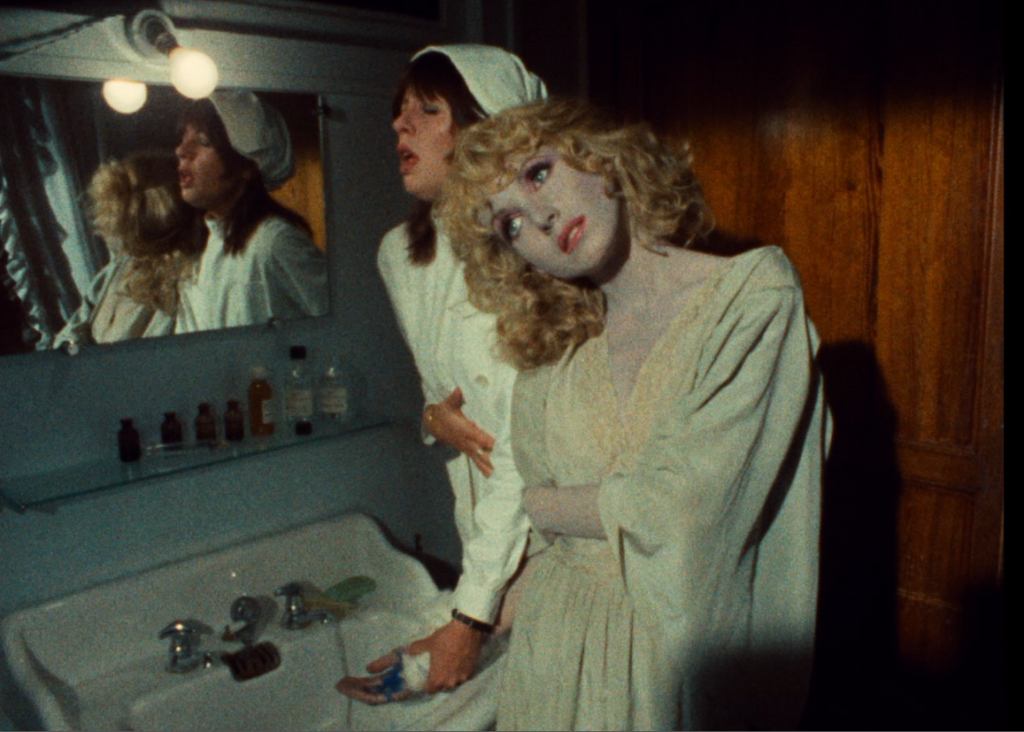
Céline plays nurse to a bleeding ghost (Bulle Ogier).
When Julie and Céline are finally able to get to the bottom of the mystery, they’re doing so as participants rather than observers. Storming the stage after a certain amount of rehearsal (they’ve witnessed the ghosts’ repeated dialogue often enough that they’ve written a script), the two dress as nurses to play the same part in turns. (Tag-teaming becomes necessary when Céline gets queasy tending to one ghost’s bloody hand – even though the blood, in this moonlit reality, has become bright blue.) Our actor stand-ins are giddy with excitement at the opportunity to take a part in their favorite drama – in a modern version, they’d be writing slash fiction about these restless spirits. And so they subvert the drama with glee. Rivette was a curious figure, a founding father of the French New Wave and editor of Cahiers du Cinéma whose output was stingy during the height of Godard and Truffaut, and whose formal inventiveness was never as purely cinematic as his more famous peers. Instead, this obsessive movie lover made films that exposed his deep love of literature and the stage, and celebrated storytelling and its seductive embrace. True, some of his films are endurance tests, but more often than not the lengthy runtimes are just breathing space to let his performers run riot, and to draw the viewer down a vortex of mystery, spontaneous games, and female magic.
